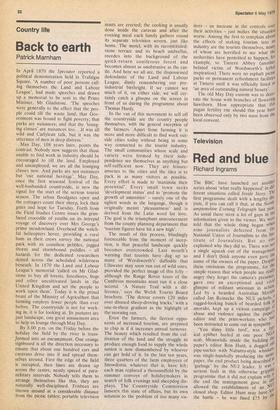Country life
Back to earth
Patrick Marnham
In April 1870 the Spectator reported a political demonstration held in Trafalgar Square. 'A number of poor persons calling themselves the Land and Labour League', had made speeches and drawn up a memorial to be sent to the Prime Minister, Mr Gladstone. 'The speeches were generally to the effect that the people could till the waste land; that Government was bound to fight poverty; that parks are nuisances; and that the 'lounging classes' are nuisances too...It was all wild and Carlylean talk, but it was the utterance of men in deep distress.'
May Day, 108 years later, points the contrast. Nobody now suggests that those unable to find work in industry should be encouraged to till the land. Employed and unemployed, we are all the lounging classes now. And parks are not nuisances but 'our national heritage'. May Day, once the first seasonal festival of the well-husbanded countryside, is now the signal for the start of the serious tourist season. The urban floodgates open and the cottagers count their sheep, lock their gates and hope for Tuesday. Forth from the Field Studies Centre issues the grimfaced crocodile of youths on its intrepid voyage of discovery over Mrs George's prime meadowland. Overhead the watchful helicopters hover, providing a rural hum as their crews survey the national park with its countless pebbles, jagged thorns and stormbound puddles — all hazards for the dedicated researchers dotted across the scheduled wilderness beneath. In 1870 the Land and Labour League's memorial 'called on Mr Gladstone to buy all forests, foreshores, bogs and other uncultivated lands in the United Kingdom and set the people to work upon them'. Today it is the proud boast of the Ministry of Agriculture that farming employs fewer people than ever before. The countryside is not for working in, it is for looking at. Its pastures are just landscape, one great amusement area to help us lounge through May Day.
By 8.00 p.m. on the Friday before the holiday the field by the river is transformed into an encampment. One orange signboard is all the direction necessary to ensure that about one hundred cars and caravans drive into it and spread themselves around. First the edge of the field is occupied, then lines are drawn up across the centre, neatly spaced at paramilitary intervals. Nobody tells them to arrange themselves like this, they are naturally well-disciplined. Frisbees are thrown around at a considerable distance from the picnic tables; portable television masts are erected; the cooking is usually done inside the caravan and after the evening meal each family gathers round its separate television screen, just like home. The motel, with its reconstitutedstone terrace and its beach umbrellas, recedes into the background of the quick-return coniferous forest and becomes almost as unobtrusive as the castle. And here we all are, the dispossessed defendants of the Land and Labour League, dimly remembering our preindustrial birthright. If we cannot see much of it, on either side, we will certainly catch a glimpse on the screen in front of us during the programme about Thomas Hardy.
In the van of this movement to sell off the countryside are the country people themselves, with the general exception of the farmers. Apart from farming it is more and more difficult to find work outside cities today without being in some way connected to the tourist industry. The small communities whose scale and variety were formed by their independence see themselves as anything but self-sufficient now. They are leisureannexes to the cities and the idea is to pack in as many visitors as possible. Every effort is made to `maximige their potential'. Every small town seeks `development status' and to 'promote the growth of amenities' — surely one of the ugliest words in the language, though it originally meant 'pleasantness' and is derived from the Latin word for love. The goal is the triumphant announcement from the county planning department that 'tourism figures have hit a new high'.
The result of this process, blindingly foreseeable from the moment of inception, is that peaceful landscape quickly becomes overcrowded. Last month's warning that tourists have dug up so many of 'Wordsworth's' daffodils that Ullswater may soon run out of wild ones, provided the perfect image of this folly — although the Range Rover tours of the Cambrian mountains must run it a close second. 'A Nature Trail with a dif ference,' says the Welsh Tourist Board brochure. 'The detour covers 120 miles over disused sheep-droving tracks,' with a one-in-three gradient as the highlight of the morning run.
Even the farmers, the fiercest• opponents of increased tourism, are prepared to chip in if it increases annual turnover.
The beauty which resulted from the cultivation of the land and the struggle to produce enough food to supply the whole nation is now dismembered by whoever can get hold of it. In the last ten years, three quarters of the farm employees of Snowdonia, whatever that is, have left; each man replaced a thousandfold by the
summer convoys of holidaymakers in
search of folk evenings and sheepdog displays. The Countryside Commission laments this state of affairs, but its own solution to the problem of too many vis
itors — an increase in the controls over their activities — just makes the situatioa worse. Among the first to complain about the effects of making tourism into an industry are the tourists themselves, manY of whom are horrified to see what the authorities have permitted to happen, for ekample, to Tintern Abbey (another belated victim of Wordsworth's lethal inspiration). There were no asphalt picnic parks or permanent refreshment facilities at Tintern until it was officially listed as 'an area of outstanding natural beauty'.
The old May Day custom was to decorate the house with branches of flowerin.g hawthorn. How appropriate that this pagan fertility rite should this year have been observed only by two nuns from the local convent.






































 Previous page
Previous page